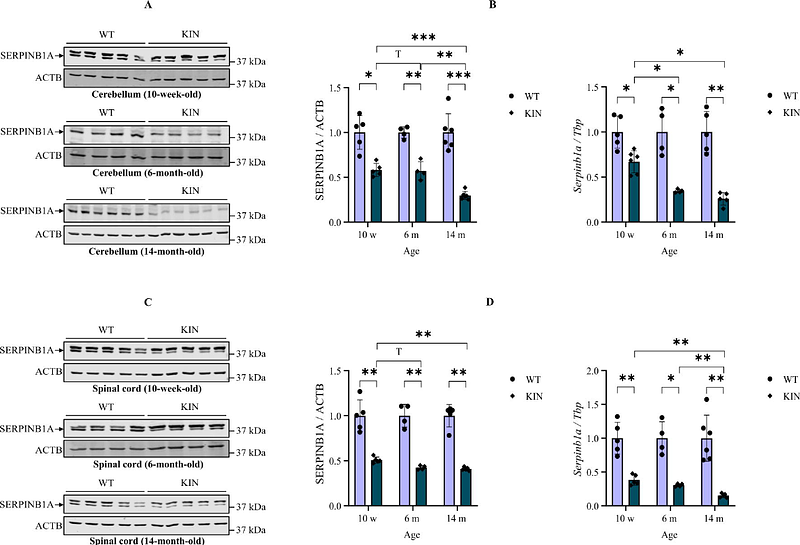Multiomics approach identifies SERPINB1 as candidate progression biomarker for Spinocerebellar Ataxia type 2

Multiomics approach identifies SERPINB1 as candidate progression biomarker for Spinocerebellar Ataxia type 2
Almaguer-Mederos, L. E.; Key, J.; Sen, N.-E.; Canet-Pons, J.; Doering, C.; Meierhofer, D.; Gispert-Sanchez, S.; Cuello-Almarales, D.; Almaguer-Gotay, D.; Osorio-Gonzalez, L. M.; Aguilera-Rodriguez, R.; Medrano-Montero, J.; Auburger, G.
AbstractBackground: Spinocerebellar ataxia type 2 (SCA2) is a polyglutamine disorder, and variants in its disease protein Ataxin-2 act as modifiers in the progression of Amyotrophic Lateral Sclerosis. There are no reliable molecular progression biomarkers for SCA2. Objectives: The aim of this study was to define novel molecular progression biomarker candidates for SCA2. Methods: Using cerebellar and cervicothoracic spinal cord RNA from Atxn2-CAG100-KnockIn and wildtype mice, a multi-omics study was conducted, followed by validation in mice and humans. Global transcriptome studies were conducted using the Clariom D microarray. Extracted proteins were analyzed by LC-MS/MS for global proteomics, and Immobilized Metal Affinity Chromatography for phosphoproteomics. Validation assessed expression by RT-qPCR, and protein abundance by quantitative immunoblots and ELISA. Patients with SCA2 were diagnosed following standard procedures, and the age at onset, SARA score, INAS count, and disease duration were used as clinical severity markers. Results: Venn diagram comparisons across all OMICS datasets indicated that only Serpinb1a-transcript, SERPINB1A-protein and -phosphopeptides were consistently downregulated at terminal stage in 14-month-old KnockIn mice. Expression studies in cerebellum and spinal cord from 10 weeks (pre-manifest), 6-month-old (early ataxic), and 14-month-old (late ataxic stage) mice confirmed this progressive decrease at mRNA and protein level. SERPINB1 plasma levels were significantly lower in SCA2 patients, and displayed a significant association with the CAG repeat length at expanded ATXN2 alleles and the age at onset, also showing a trend towards significance with the SARA score. Conclusions: SERPINB1 was identified as novel promising biomarker with specificity for SCA2 pathomechanisms.